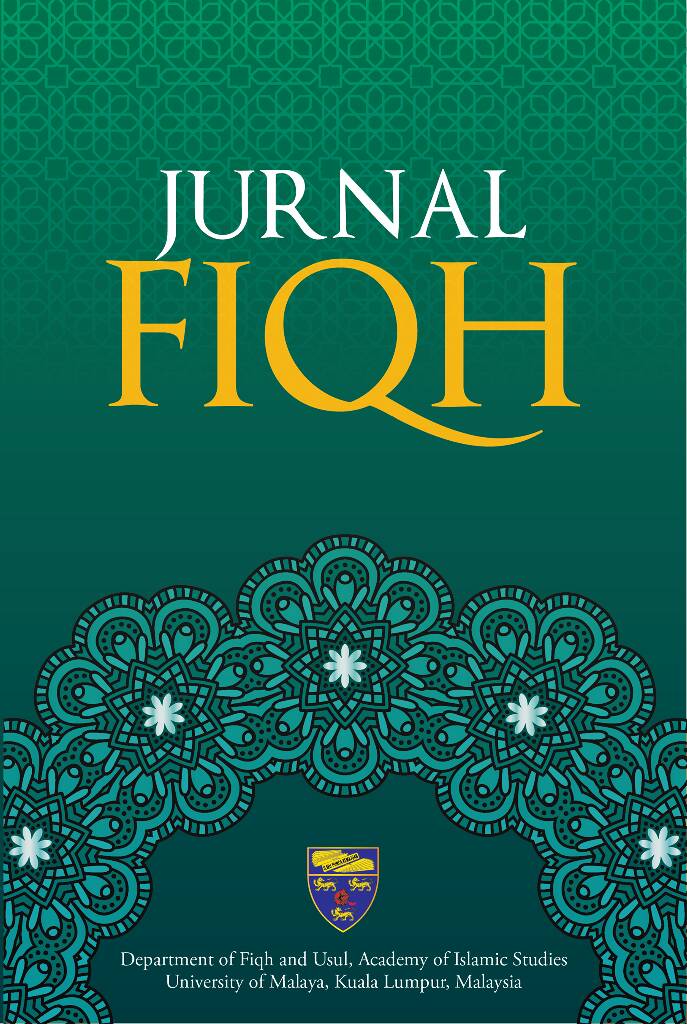حكم التصويت للأصلح في الانتخابات
The Ruling on Voting for the Most Qualified Candidate in the Elections
DOI:
https://doi.org/10.22452/fiqh.vol19no2.4Abstract
This study addresses the issue of ruling on voting for the most qualified candidate in elections which is one of the important issues in the present time and requires deliberation from Muslim scholars. This issue has led to different opinions and divisions among people in a single country. Hence, the major question in this study; what is the position of Islamic jurisprudence in terms of voting for a highly qualified candidate? It is an important question as it relates to governance and seigniory which also concerns all people who take part in elections as the consequences may affect the community. Hence, this study aims to clarify the issue of voting for a highly qualified candidate in elections by gathering and analyzing contemporary researchers’ views and arguments to reach a superior jurisprudent summary. This study also aims to obtain the most appropriate opinion that fits the purposes of Islamic law and the current situation. To achieve the objective, this study employed analytical, deductive, and inductive methodologies. This study concludes that voting for the fittest character is considerable for necessity since it relies on significant sharia evidence and rules such as: Necessities permit prohibitions. And the researcher recommends those people who are working in the field of religious calling to participate actively in elections and not boycotting due to the Muslims afflictions in the last few decades. If they know that there is a qualified person who can serve Islam and Muslims and decrease evil or corruption, they should vote for him, otherwise it is better to step down.
Downloads
References
Al-‘Asqalānī, Shihāb al-Dīn Aḥmad Ibn ‘Alī Ibn Ḥajar. Explanation of Sahih al-Bukhari. Bayrūt: Dār al-Ma‘rifah, .1379
Abi Abd al-A’la Khalid bin Muhammad bin Othman al-Masry، Statement of the Prohibition of Elections and the Ruling on Choosing the Righteous One in Discourses، http://m-noor. com5.
Abī Dāwud, Sulayman Ibn al-Ash‘ath al-Sijistānī al-‘Azdī. Sunan Abī Dāwūd. Bayrūt: al-Maktabah al-‘Aṣriyyah, 2009.
Aḥmad Ibn Muḥammad Ibn Ḥanbāl. Musnad Imām Aḥmad. Bayrūt: al-Risalah Foundation, 2001.
Al-Albānī, Muḥammad Naṣīr al-Dīn. The Right Series. Riyāḍ: al- Ma’arif Library, 1995.
Ali Al-Halabi، Qatari. Questions and Answers of His Eminence Muhammad bin Saleh bin Uthaymeen. ʻMān-al-Urdun: Aʻaddahā wa-ʻallaqa ʻalayhā al-Shaykh ʻAlī al-Ḥalabī, 2009.
Al-Ashqar، Omar Suleiman al-Ashqar. The Ruling on Participation in the Ministry and Representative Councils, vol. 1. ʻMān- al-Urdun: Dar al-Nafais, 2009.
Al-Bukhārī, Abī ‘Abd Allāh Muḥammad Ibn Ismā‘il al-Ju‘fī. Ṣaḥīḥ al-Bukhārī. Bayrut: Dār al-Ṭawq al-Najah, 1422.
Ibn al-Qayyim al-Jawziyyah, Abī ‘Abd Allāh Muḥammad Ibn Abī Bakr Shams al-Dīn. Informing Those Who Signed on the Authority of the Lord of the Worlds. Bayrūt: Dār al-Kutub al-‘Alamiyyah, 1991.
Ibn al-Qayyim al-Jawziyyah, Abī ‘Abd Allāh Muḥammad Ibn Abī Bakr Shams al-Dīn. Ṭuruq al-Ḥukmiyyah fi al-Siyāsah al- Shar‘iyyah. Qāhirah: Al-Madani Press, 2019.
Ibn Hisham. Biography and Honorable Virtue. Bayrūt: Dār al-Jīl 1411.
Ibn Mājah, Abū ‘Abd Allāh Muḥammad Ibn Yazid al-Qazwinī. Sunan Ibn Mājah. Dimashq: Dār al-Risala International, 2009.
Ibn Nujaym, Zayn al-Dīn Ibn Ibrāhim. al-Bahr al-Rā’iq Sharḥ Kanz al-Daqā’iq. Bayrūt: Dār al-Ma‘rifah, n.d.
Ibn Taymiyyah, Abī ‘Abbās Taqī al-Dīn Aḥmad Ibn ‘Abd al-Ḥalīm. Majmū‘ al-Fatawā. Saudi ‘Arabia: Majma‘ al-Malik, 1995.
Ismail Abdel Rahman، Election Criteria in Islamic Sharia، http:// www.saaid. M.
Liwaa al-Islam magazine، issue 3، Dhu al-Qi`dah، June 1989.
Maher Al-Jabari، Elections between Democracy and Islam، Member of the Media Office of Hizb ut Tahrir in Palestine Publish date: 03-04-2013 https://pulpit.alwatanvoice.com/
Muslim, Abī al-Ḥusayn Muslim Ibn al-Ḥajjāj Ibn al-Qushayrī al-Naysabūrī. Ṣaḥīḥ Muslim. Bayrūt: Dār Revival of Arab Heritage.
Al-Naysaburī, Abī ‘Abd Allāh Ibn ‘Abd Allāh al-Ḥākim. al- Mustadrak ‘ala al-Ṣaḥīḥaynī. Bayrūt: Dār al-Kutub al- ‘Ilmiyyah, 1990.
Ṣafī al-Raḥman al-Mubarakfūrī. Political Parties in Islam. Qāhirah: Dār Sabīl al-Mu’minīn, 2012.
Suleiman bin Dawood bin Al-Jaroud. Musnad Abi Dawood Al- Tayalisi. Misr: Center for Arabic and Islamic Research and Studies, 1999.
Al-Tabarani, Sulayman bin Ahmad bin ‘Ayoub Abu Al-Qasim. The Great Dictionary. Mosul: Library of Science and Governance, 1983.











